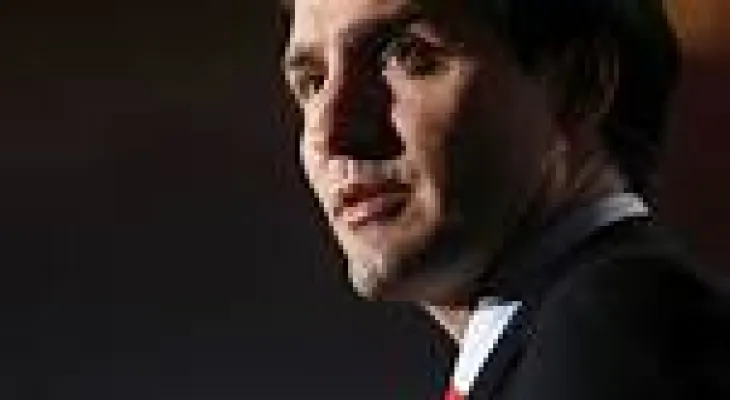Search here
Newspaper
Search here

Arab Canada News
News

Published: October 4, 2023
Prime Minister Justin Trudeau confirmed today, Wednesday, that senior bureaucrats are reviewing the Descheneaux report – an independent investigation from the 1980s looking into alleged Nazi war criminals in Canada – with the aim of releasing more of it to the public.
Governor General Mary Simon also stated today that Rideau Hall is sorry for honoring Peter Savaryn – a former advisor at the University of Alberta who served in the same Nazi unit as Jaroslav Hunka – by awarding him the Order of Canada.
A spokesperson for Simon said, "We sincerely apologize to Canadians for any distress or pain his appointment may have caused."
The Office of the Lieutenant Governor is also examining the Golden and Diamond Jubilee medals that were previously awarded to Savaryn, who also served as the president of the Ukrainian World Congress, a group that represents the Ukrainian diaspora.
The final report of the Descheneaux committee was released in 1986, after being crafted by former Prime Minister Brian Mulroney, and consists of two parts.
The first part, which included recommendations to facilitate the extradition of war criminals, was made public. The second part was classified as secret and did not disclose the names of alleged Nazis in Canada.
Jewish groups, including B'nai Brith and Friends of Simon Wiesenthal Center (FSWC), stated that the second part should be unredacted and released publicly so Canadians can learn more about the country's shameful history of accepting countless Nazi collaborators after World War II.
In the wake of the Hunka case – when a former soldier aged 98 from a Nazi unit was honored in Parliament – Canada must consider the questionable post-war immigration decisions that allowed Hunka and others like him to settle here and live in relative peace.
Trudeau told reporters, "Senior public servants are carefully studying this issue, including searching the archives," "We will make recommendations."
Reports suggest that as many as 2,000 Ukrainian members of Hitler’s Nazi Waffen-SS were accepted into Canada after the war – following some British prodding. The committee stated that the number is likely lower than that.
In an interview with CBC News, Michael Levitt, president and CEO of FSWC, said the country needs to know if thousands of war criminals were accepted into Canada.
"The phrase 'sunlight is the best disinfectant' couldn't be more relevant to this situation. If there is a problem in Canadian history that requires cleansing, it is our shameful record of covering up the immigration of Nazi war criminals to Canada in the 1940s and 1950s," he said. "It’s long overdue."
In response to a question about whether he had any idea why the government was hiding details of post-war Nazi immigration, Levitt said, "The only way we will get the answers we seek is by opening the unredacted files."
Liberal MP Anthony Housefather from Quebec said it is a sensitive issue because the government does not want to "bring pain to many Eastern European communities."
For example, Hunka framed his war service as a battle for Ukrainian independence.
The unit he fought for, the 1st Galician Division, is also commemorated by Ukrainian diaspora groups at various sites across the country.
They claim that the Waffen-SS troops were fighting not to promote Hitler's racist agenda and genocide but to counter the totalitarian Soviet Union.
The Descheneaux report also concluded that allegations of war crimes committed by this division "were never proven."
This finding contradicts what the post-war Nuremberg Trials led by the Allies concluded about SS units like that one.
For this reason, Jewish groups say they want to see everything the Descheneaux committee gathered to better understand its conclusions.
We must acknowledge that we have a horrific past with Nazi war criminals. We opened our country to people after the war in a way that made it easier for a Nazi to come than a Jew."
"We need to look at what the redactions are in the Descheneaux report. I'm sure there is a lot that could be unredacted. We just need to find a consensus. You can't just say, willingly or unwillingly, 'Release everything,' because I don’t know exactly what it is, and there are privacy interests involved."
The spokesperson for Conservative Leader Pierre Poilievre has not yet commented on whether the party supports the full release of the Descheneaux report.
Conservative MP Gérard Deltell from Quebec, Poilievre's environmental critic, said Wednesday that he is not open to reconsidering the matter at this time.
In response to a question about whether the secret report should be released for everyone to read, he said, "I don't think so."
He said, "I don’t think this is the occasion to review it. Right now, I’m not there. And I don’t think the time has come to review everything. History is history."
Deltell said that as the son of a Canadian World War II veteran, the controversial honoring of Hunka was a painful moment for him personally.
He added about his late father, who lived with German shrapnel lodged in his head until his death, "I can’t imagine what his reaction would have been when his son warmly greeted Nazis."
New Democratic Party Leader Jagmeet Singh said he supports the release of the committee report.
Singh told CBC News on Sunday, "We definitely need more transparency."
"We will support calls for more transparency about who is allowed in."
Comments